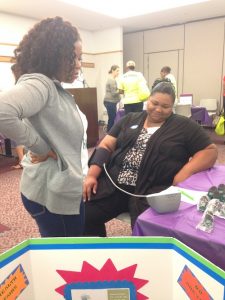 CHAPEL HILL- Teaching in child care is a rewarding and important job, yet 42% of the North Carolina adults who provide child care live below the national poverty threshold, 66% fight obesity, and 36% struggle with depression. A recent study from UNC-Chapel Hill (UNC) researchers published in the International Journal of Environmental Research and Public Health found that the adults who care for North Carolina’s small children have challenges at work.
CHAPEL HILL- Teaching in child care is a rewarding and important job, yet 42% of the North Carolina adults who provide child care live below the national poverty threshold, 66% fight obesity, and 36% struggle with depression. A recent study from UNC-Chapel Hill (UNC) researchers published in the International Journal of Environmental Research and Public Health found that the adults who care for North Carolina’s small children have challenges at work.
Researchers from UNC’s Caring and Reaching for Health (CARE) worksite wellness program analyzed health data for 674 child care workers across seven counties in North Carolina as they began a program to analyze the health and working conditions of child care workers. CARE is an initiative of the UNC Center for Health Promotion and Disease Prevention.
The CARE team found that 66% of child care providers qualified as obese, and often they reported that they eat less than half of the USDA recommended level of fruits and vegetables in a day. Complicating the situation even further, more than a third of the providers CARE assessed (36.1%) suffered symptoms of depression.
“The women who work at child care centers are doing one of the most important jobs in our state, and many young children spend most of their waking hours in child care” said Dianne Ward, Director of the UNC Children’s Healthy Weight Research Group, professor of nutrition in the Gillings School of Global Public Health and one of the study’s principal investigators. “Our findings underscore the importance of providing workers with tools and resources to lead healthier lives.”

Nearly half the people who care for North Carolina’s children when their parents are unavailable have incomes at or below the national poverty threshold for a family of three; 42% of workers in the study had a household income of less than $20,000 per year.
“Child care providers are doubly stressed by low wages and demanding jobs. Focusing on the health of child care workers is long overdue,” said Laura Linnan, ScD, lead author of the paper, co-principal investigator of the study and professor of health behavior at Gillings. “We believe these results represent an important call to action for researchers, policy makers and community leaders who can advocate for living wages and access to more health-related programs at work for these important members of the workforce.”
CARE is a 5-year study which began in 2015 and uses a web-based tracking system to assist child care workers set goals and monitor their physical activity. The study also provides resources to help workers eat healthier, quit smoking, and improve their sleeping habits. Furthermore, CARE research staff work with center directors to facilitate the adoption and implementation of workplace health and safety programs, policies, and supports to bolster the health and well-being of workers at participating centers. The research team will learn if these efforts to improve health behaviors lead to better health outcomes overall for participants in the study. The study included participants from Cumberland, Rowan, Forsyth, Davidson, Franklin, Granville, and Vance counties.
Following baseline data collection, workers participate in a 6-month long workplace health and safety promotion program or an alternate financial health program. The UNC team will publish results on the effectiveness of these programs in 2018.
For inquiries:
Sonya Sutton, HPDP Communications Specialist
919-966-4118
Acknowledgements: NHLBI R01HL119568; CDC U48DP001944; www.chart.unc.edu; www.chaicore.com
